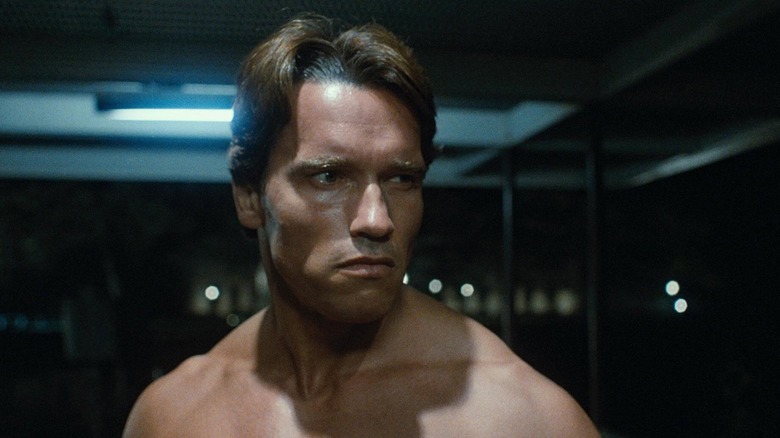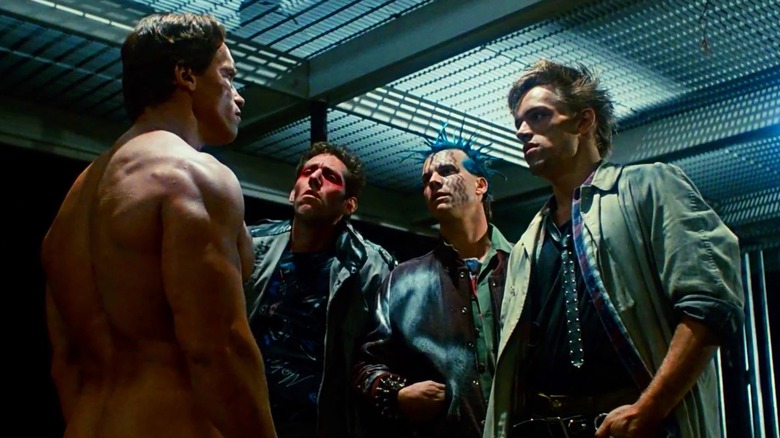Director James Cameron Believes The Events In The Terminator Could Happen In Real Life
James Cameron's 1984 film "The Terminator" follows a grim timeline for humanity. At some point in the future, humans will unwittingly create a computerized artificial intelligence that will, upon its self-realization, immediately begin a years-long campaign to wipe out humanity. The machines will build a robotic skeleton army of Terminators, and dispatch laser tanks and flying mechanical behemoths to get the job done. Only a few humans will survive, and will gather together into a plucky and effective counter-force against the machine army. The humans are only organized due to the efforts of a man named John Connor, a powerful military commander, and humanity's last hope.
Also in Cameron's vision of things, the machines are losing the war. Although the landscape has become an eternally dark hellscape of human skulls, humans are effectively fighting off their assailants. In a last-ditch effort to wipe out the resistance, the machines — possessing access to time travel — elect to send a single Terminator (Arnold Schwarzenegger) back in time to 1984 to wipe out John Connor's mother Sarah (Linda Hamilton) before he was ever born.
The premise, it seems, is very similar to a 1964 episode of "The Outer Limits" called "Soldier" written by Harlan Ellison. Indeed, the similarity was so strong that it led to legal action. Ellison did end up receiving a credit for "The Terminator" while the film took off, making huge amounts of money and spawning a long and increasingly convoluted series of sequels. Cameron, however, only directed the first and second films.
The "Terminator" series is largely about how human reliance on machines has become distressing, and that a machine takeover is, in a very practical sense, nigh. Cameron himself certainly seems to think so.
The rise of the machines
While James Cameron is quite adept at creating and filming exciting machines, guns, and other futuristic technology (as seen in both his "Terminator" films, "Aliens," and his "Avatar" movies), his films tend to be about how the military and machine-wielders are alternately powerless and suspicious. Ironically, one of the most tech-forward filmmakers of his generation tells stories of trusting the natural world over any machines humans may build.
The filmmaker expressed his trepidation about a machine takeover in the December 19, 2022 episode of "Smartless," a podcast hosted by Sean Hayes, Will Arnett, and Jason Bateman. Cameron, as their guest, talked about making his new film "Avatar: The Way of Water" before diverging into his thoughts on a dark machine future:
"Well, I'm not 'afraid' but I'm certainly pretty concerned about the potential for misuse of A.I. I think A.I. can be great, but also it could literally be the end of the world. You talk to all of the A.I. scientists — and I know a bunch of them — and every time I put my hand up at their seminars or something, they just start laughing. 'Oh, that's the Skynet Guy, sure, we really want to hear from you.' The point is that no technology has ever not been weaponized. And do we really want to be fighting something smarter than us that isn't us on our own world? I don't think so."
Cameron does have a point: Humanity tends to find either a money-making or a destruction use for many technological advances. Science, in an ideal world, would be used to save us and help us. In practice, well, humans invent atomic bombs.
It could already have happened
James Cameron also pointed to recent trends in media consumption as potential proof that A.I. has already infiltrated far more deeply into human society than humanity might appreciate. It's already known that social media platforms like Twitter use A.I. to specially curate a user's individual feed. The algorithm, it has been discovered, reacts to outraged replies more often than pleasant ones, leading to an increase in hateful and extreme language on the platform in general. It's all meant to increase engagement, but it's also creating and encouraging dangerous ways of thinking.
These types of stories have Cameron feeling increasingly suspicious of machines. He claimed that A.I. could be deliberately harming us, saying:
"Look, an A.I. could've taken over the world and already be manipulating it, and we just don't know because it would have control over all of the media and everything. And what better explanation for how absurd everything is right now. Because nothing makes a damn bit of sense to me, I don't know about you."
Co-host Will Arnett expanded on Cameron's idea, explaining that A.I., presumably smarter than humans, would be wise enough to erode human minds without letting its own existence be known. It may be a paranoid conspiracy theory, of course, and one that cannot be proven or disproven (un-provability being the primary feature of conspiracy theories), but it's a notion that tracks, knowing its source. Cameron, after all, envisioned a nightmare story about a robot from the future stalking a woman in the present. This seems to be based in real fear nowadays.


